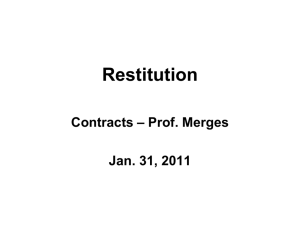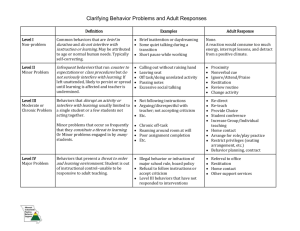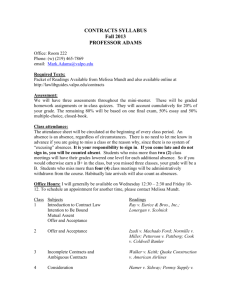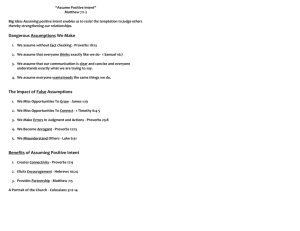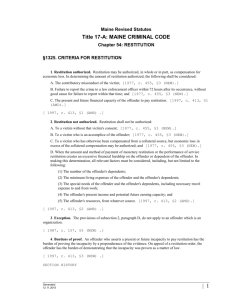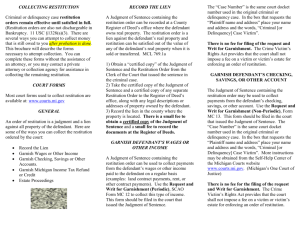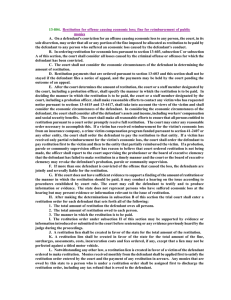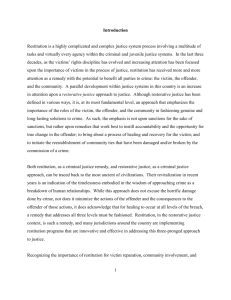RESTITUTION THE ANCIENT LANDMARK
advertisement
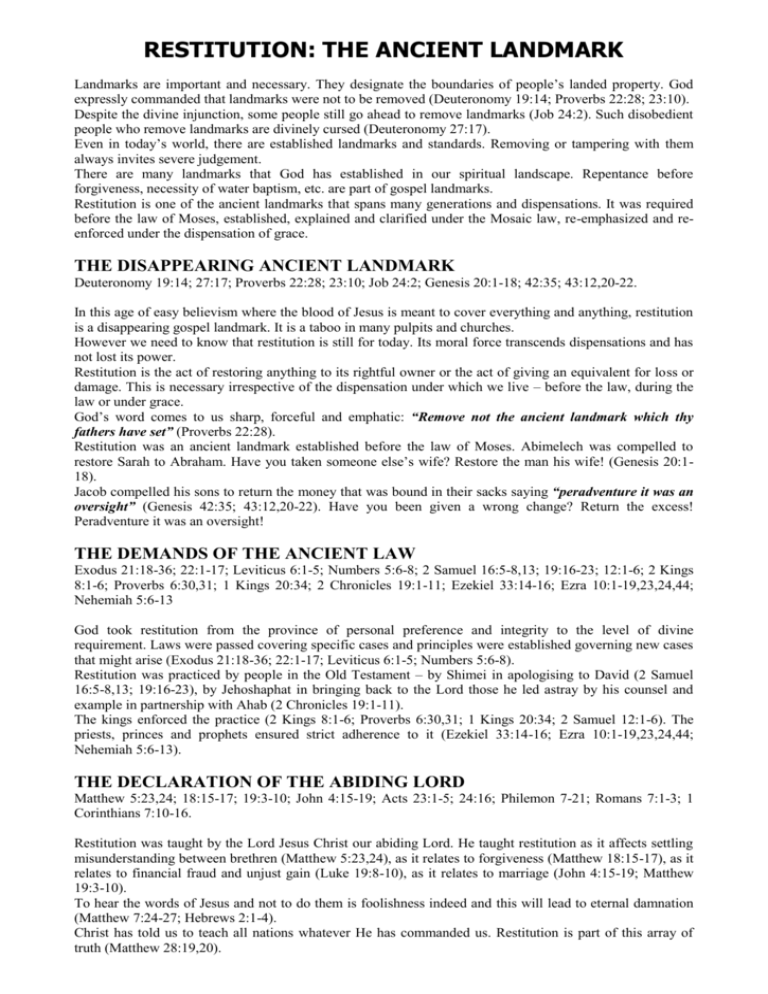
RESTITUTION: THE ANCIENT LANDMARK Landmarks are important and necessary. They designate the boundaries of people’s landed property. God expressly commanded that landmarks were not to be removed (Deuteronomy 19:14; Proverbs 22:28; 23:10). Despite the divine injunction, some people still go ahead to remove landmarks (Job 24:2). Such disobedient people who remove landmarks are divinely cursed (Deuteronomy 27:17). Even in today’s world, there are established landmarks and standards. Removing or tampering with them always invites severe judgement. There are many landmarks that God has established in our spiritual landscape. Repentance before forgiveness, necessity of water baptism, etc. are part of gospel landmarks. Restitution is one of the ancient landmarks that spans many generations and dispensations. It was required before the law of Moses, established, explained and clarified under the Mosaic law, re-emphasized and reenforced under the dispensation of grace. THE DISAPPEARING ANCIENT LANDMARK Deuteronomy 19:14; 27:17; Proverbs 22:28; 23:10; Job 24:2; Genesis 20:1-18; 42:35; 43:12,20-22. In this age of easy believism where the blood of Jesus is meant to cover everything and anything, restitution is a disappearing gospel landmark. It is a taboo in many pulpits and churches. However we need to know that restitution is still for today. Its moral force transcends dispensations and has not lost its power. Restitution is the act of restoring anything to its rightful owner or the act of giving an equivalent for loss or damage. This is necessary irrespective of the dispensation under which we live – before the law, during the law or under grace. God’s word comes to us sharp, forceful and emphatic: “Remove not the ancient landmark which thy fathers have set” (Proverbs 22:28). Restitution was an ancient landmark established before the law of Moses. Abimelech was compelled to restore Sarah to Abraham. Have you taken someone else’s wife? Restore the man his wife! (Genesis 20:118). Jacob compelled his sons to return the money that was bound in their sacks saying “peradventure it was an oversight” (Genesis 42:35; 43:12,20-22). Have you been given a wrong change? Return the excess! Peradventure it was an oversight! THE DEMANDS OF THE ANCIENT LAW Exodus 21:18-36; 22:1-17; Leviticus 6:1-5; Numbers 5:6-8; 2 Samuel 16:5-8,13; 19:16-23; 12:1-6; 2 Kings 8:1-6; Proverbs 6:30,31; 1 Kings 20:34; 2 Chronicles 19:1-11; Ezekiel 33:14-16; Ezra 10:1-19,23,24,44; Nehemiah 5:6-13 God took restitution from the province of personal preference and integrity to the level of divine requirement. Laws were passed covering specific cases and principles were established governing new cases that might arise (Exodus 21:18-36; 22:1-17; Leviticus 6:1-5; Numbers 5:6-8). Restitution was practiced by people in the Old Testament – by Shimei in apologising to David (2 Samuel 16:5-8,13; 19:16-23), by Jehoshaphat in bringing back to the Lord those he led astray by his counsel and example in partnership with Ahab (2 Chronicles 19:1-11). The kings enforced the practice (2 Kings 8:1-6; Proverbs 6:30,31; 1 Kings 20:34; 2 Samuel 12:1-6). The priests, princes and prophets ensured strict adherence to it (Ezekiel 33:14-16; Ezra 10:1-19,23,24,44; Nehemiah 5:6-13). THE DECLARATION OF THE ABIDING LORD Matthew 5:23,24; 18:15-17; 19:3-10; John 4:15-19; Acts 23:1-5; 24:16; Philemon 7-21; Romans 7:1-3; 1 Corinthians 7:10-16. Restitution was taught by the Lord Jesus Christ our abiding Lord. He taught restitution as it affects settling misunderstanding between brethren (Matthew 5:23,24), as it relates to forgiveness (Matthew 18:15-17), as it relates to financial fraud and unjust gain (Luke 19:8-10), as it relates to marriage (John 4:15-19; Matthew 19:3-10). To hear the words of Jesus and not to do them is foolishness indeed and this will lead to eternal damnation (Matthew 7:24-27; Hebrews 2:1-4). Christ has told us to teach all nations whatever He has commanded us. Restitution is part of this array of truth (Matthew 28:19,20). Paul the apostle, one of the exponents of the gospel truth preached and practiced restitution (Acts 23:1-5; 24:16; Philemon 7-21; Romans 7:1-3; 1 Corinthians 7:10-16). THE DUTY OF THE ABSOLUTELY LOYAL Psalm 40:8; Hebrews 10:7; John 2:5; 14:15; Isaiah 1:19,20; Matthew 28:19,20; 7:24-27; Luke 11:28; 2 John 9-11; 1 Peter 1:14-16 Restitution may not be a fashionable teaching or a convenient truth for some but it is still God’s word. The duty of the absolutely loyal is to declare: “I come to do thy will O God” (Psalm 40:8; Hebrews 10:7). Irrespective of our social or spiritual standing, restitution must be done when necessary. It will take humility for kings like Abimelech and Jehoshaphat, apostles like Paul, highly placed government officials like Zacchaeus, partriachs like Jacob to do restitution (Genesis 20:1-18; 43:12,20-22; 2 Chronicles 19:1-11; Acts 23:1-5; Luke 19:8-10). God’s moral demands and requirements do not change. Obedience befits us in the matter of restitution. Even when it is very difficult, we need to pray for God’s grace and seek counselling on what to do.

